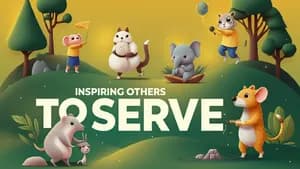Introduction: The Transformative Power of Service
For years, I've witnessed firsthand the incredible impact of service-learning on students. It's not just about ticking off volunteer hours; it's about fostering empathy, developing crucial life skills, and building a stronger community. This article will guide you through effectively integrating volunteer opportunities into your educational journey, whether you're a student looking to make a difference or a parent supporting your child's growth. We'll explore practical strategies to make service-learning a meaningful and lasting part of your life.
Finding the Right Fit: Identifying Volunteer Opportunities
The key to successful service-learning lies in finding opportunities that genuinely resonate with your interests and passions. Don't feel pressured to choose something simply because it's popular or convenient. Consider your strengths and what causes you care deeply about. Are you passionate about animals? Perhaps volunteering at an animal shelter or wildlife rehabilitation center would be a perfect fit. Do you enjoy working with children? Explore tutoring programs, mentoring initiatives, or assisting at after-school activities. If you're interested in environmental issues, consider volunteering with a local park or environmental organization for cleanup efforts or educational programs.
Many schools have dedicated service-learning coordinators or clubs that can help you discover local opportunities. Online platforms like VolunteerMatch and Idealist also provide extensive listings of volunteer positions catering to various interests and skill levels. Remember to research organizations thoroughly before committing; ensure their values align with your own and that the opportunity provides structure and supervision.
Don't underestimate the power of smaller, local initiatives. Often, the most impactful service happens within your own community. Think about your neighborhood: Could you help at a local food bank, assist elderly neighbors with errands, or organize a community cleanup drive?
Making it Meaningful: Integrating Service into Academics
Service-learning shouldn't exist in isolation from your academic pursuits. Ideally, it should complement and enhance your learning. For example, if you're studying history, volunteering at a historical society or museum can bring your classroom learning to life. If you're focused on science, consider assisting with environmental conservation projects or working in a scientific research lab. Even seemingly unrelated volunteer experiences often provide valuable transferable skills—communication, teamwork, problem-solving—that are highly valued in academic and professional settings.
Discuss your volunteer experiences with your teachers. They may be able to offer insights, suggest relevant assignments, or even allow you to integrate your volunteer work into class projects or presentations. This not only strengthens the connection between service and academics but also demonstrates your initiative and commitment to learning. Consider keeping a reflective journal to document your experiences and analyze the impact of your volunteer work, connecting it to what you’re learning in the classroom. This reflective practice is a vital component of making service learning truly meaningful.
Developing Essential Skills: Beyond the Volunteer Hours
Volunteering offers invaluable opportunities to develop a wide array of essential skills. Beyond the direct contributions to the community, you'll gain experience in teamwork, communication, problem-solving, leadership, and time management. These are not simply “soft skills”; they are highly sought-after attributes in the modern workforce and are crucial for success in almost any field. When you volunteer, you're not only helping others; you're actively building your resume and strengthening your personal development.
For instance, organizing a fundraising event for a charity will hone your planning, budgeting, and communication skills. Working with a team of volunteers will teach you the importance of collaboration, compromise, and conflict resolution. Even simple tasks, like assisting with data entry or organizing supplies, will improve your attention to detail and organizational abilities. Actively reflect on the skills you're gaining and how you can apply them in other areas of your life. Highlighting these experiences and skills in your college applications or job interviews will demonstrate your well-roundedness and commitment to personal growth.
Building Lasting Habits: Cultivating a Lifelong Commitment
The most significant outcome of integrating volunteering into your education is the development of a lifelong commitment to service. Once you experience the profound satisfaction of making a positive impact on your community, you're more likely to continue contributing throughout your life. This commitment isn’t about accumulating hours; it’s about internalizing a value system that prioritizes helping others and contributing to the greater good.
Encourage your children, or if you are a student, strive to find volunteer opportunities that are sustainable and enjoyable. Think of it as building a relationship with a cause or organization—a long-term investment in something you care about. Consider joining a local organization or club dedicated to a cause that aligns with your interests. This provides a consistent outlet for your service and helps build community connections. Involving your family and friends in your volunteer efforts can also create a shared experience and help instill a sense of community responsibility in everyone involved. This shared commitment is a powerful way to ensure a lasting legacy of service.
Conclusion: A Journey of Growth and Contribution
Integrating volunteer opportunities into your education is not simply about fulfilling requirements; it’s about embarking on a transformative journey of personal and societal growth. By thoughtfully selecting opportunities, connecting service to your academic pursuits, and developing essential life skills, you can build a lasting legacy of contribution. The benefits extend far beyond the immediate impact of your volunteer efforts; they shape your character, enhance your skills, and ultimately, lead to a more fulfilling and meaningful life. Remember, the most rewarding service is that which is both meaningful to you and beneficial to the community you serve. Embrace the opportunity to make a difference, and you’ll find it enriches your life as much as the lives you touch.

